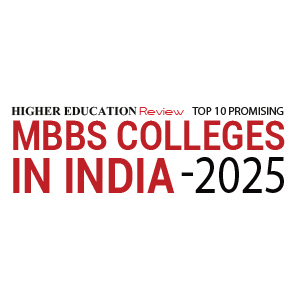
Khaja Bandanawaz University: Creating Future-Ready Doctors Through Compassionate, Tech-Driven Education
By Dr Guru Prasad KY, Dean (Faculty of Medical Sciences)
Medical education in India has seen a significant transformation driven by technological advancements, research, and a commitment to community well-being. India is home to numerous medical colleges, ranging from premier institutions like AIIMS to private universities and colleges across the country. Such institutes provide a wide variety of programs such as undergraduate, postgraduate and specialized ones, to students of every kind.
Khaja Bandanawaz University in Kalaburagi, Northern Karnataka, proves how regional institutions can become centers for great success in medical studies. Sponsored by Khaja Education Society, the university began with the objective of training medical students in both medical science and the needs of the community. In the past few years, it has grown into a multidisciplinary institution, with its Faculty of Medical Sciences offering programs that emphasize innovation, compassion, and leadership.
Being recognized by the UGC since 2018, KBN University now serves as a State-Private University, including its remarkable infrastructure, simulation labs and digital library that encourage educational progress and community efforts for a healthier nation.
The university is valued for its progressive curriculum, significant training in clinics and efforts to develop ethics and bond among its students. To learn more about the university’s mission and accomplishments, Higher Education Review spoke with Dr Guru Prasad KY, the Dean of the Faculty of Medical Sciences at KBN University.
What was the founding vision of the KBN Institute of Medical Sciences, and how has it evolved over the years?
Khaja Education Society’s goal was to establish an outstanding center for medical education that supports science and the society’s needs. Over the years, this vision has led to a mission that links innovative medical training with a strong focus on compassion. At present, the university is distinguished by its inclusiveness and community spirit which prepare students to become both skilled and caring medical workers in the healthcare sector.
By embracing both tradition and innovation, KBNU is able to respond to the changes in healthcare and influence them, creating caring and capable doctors for society
How does KBN University ensure its medical curriculum remains innovative in a rapidly evolving healthcare ecosystem?
The curriculum at KBN University regularly includes updates in research, diagnostics and the way healthcare is given. Early hands-on learning in clinics, case-based teaching across units and learning about new areas such as artificial intelligence in medicine and telehealth are all parts of the curriculum. The way students are taught allows them to prepare for and lead progress in healthcare which positions them as forward-looking professionals.
What specific advancements have been introduced in the medical curriculum at KBN University?
The Faculty of Medical Sciences has introduced new techniques, with skill learning, active research and excellent mentorship programs. Training in the curriculum digitally, with students using advanced mannequins in updated simulation labs and virtual reality tools. They support students by providing chances to practice in professional conditions. Furthermore, joint research programs in public health, pharmacotherapy and clinical innovation offer students opportunities to use what they learn.
What sets KBN University apart in terms of philosophy, pedagogy, or student culture?
The faculty uses a balancing approach that teaches students that both schoolwork and human values are important. It uses active guidance, focuses on what students learn and encourages them to practice, all made possible by a balanced teacher-to-student ratio that keeps student well-being and emotional intelligence high. Graduates can acquire the ability to be responsible to society and competent practitioners as a result of the inclusive culture.
How does KBN University nurture empathy, ethics, and leadership among its medical students?
KBN University helps its students to become empathetic, ethical and inspiring leaders by giving them practical experience, working in communities and participating in ethics workshops. Valuable learning happens as students enhance their active listening and reason ethically through early clinical experience and helping in low-income areas.
Leadership opportunities are provided through student activities, health camps, and research groups, fostering resilience and a collaborative spirit. By holding multi-specialty health camps with primary health centers, rural and community health initiatives help show the importance of fairness in health coverage and system-wide healthcare needs.
What are the academic programs currently offered at KBNU’s Faculty of Medical Sciences?
The Faculty of Medical Sciences offers undergraduate and postgraduate programs. Initially affiliated with Rajiv Gandhi Health University, the college transitioned to KBN University in 2018. The undergraduate program (MBBS) now admits 150 students annually. We offer B.Sc. in Optometry, Operation Theatre Technology (OTT) and Medical Laboratory Technology (MLT). Postgraduate programs started in 2015, span over 15 specialties. We offer MD in General Medicine, Pediatrics, Radio Diagnosis, Anesthesiology, Community Medicine, Dermatology Venereology and Leprosy, Anatomy, Pathology, Microbiology, Physiology and Pharmacology, and MS in General Surgery, Orthopedics, Obstetrics and Gynecology and Ophthalmology. These programs emphasize in-depth clinical knowledge, ethical practice, and community-centered education, enhanced by digital learning platforms, advanced simulation labs, and interdisciplinary research in public health and clinical innovation.
What infrastructure supports medical education at KBN University?
KBN University’s Faculty of Medical Sciences relies on sophisticated infrastructure aimed at supporting the best in medical teaching and healthcare. The college offers online operation theaters, hi-tech audio-visual lecture rooms, laboratory facilities, a central research center and a digital library that people can access anytime anywhere. Students at Kalaburagi are given a wide range of clinical experiences at the 750+ bed high-tech teaching hospital. Simulation labs and centers to develop skills, with modern tools and digital systems, give students valuable training in computer and artificial technology settings, preparing them for a medical career.
What is the future roadmap of the KBNU’s Faculty of Medical Sciences?
Looking ahead, we are working on a new simulation and skills center promoting alliances with international universities and research groups. Educating the community in rural areas about preventive care and health is still important, which suits India’s plan for its Indian Medical Graduates. By embracing both tradition and innovation, KBNU is able to respond to the changes in healthcare and influence them, creating caring and capable doctors for society.


